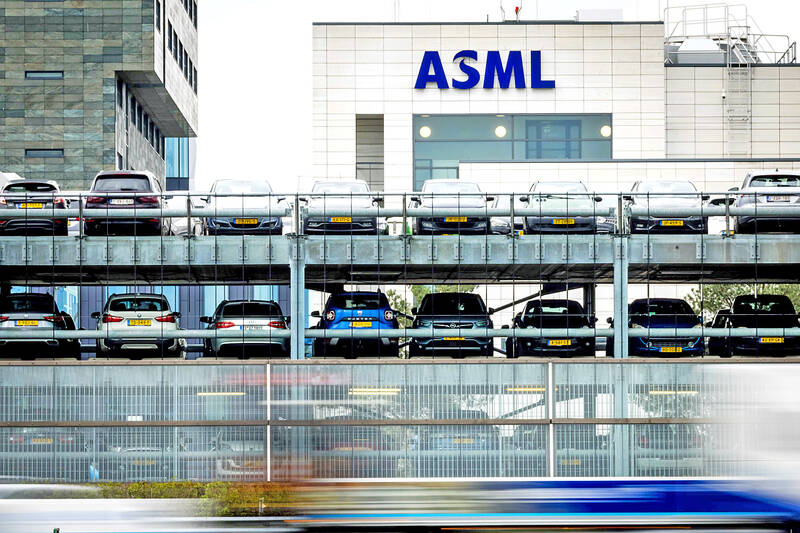US President Joe Biden’s administration plans to press the Netherlands next week to stop its top chipmaking equipment maker, ASML Holding NV, from servicing some tools in China, two people familiar with the matter said.
US Undersecretary of Commerce for Industry and Security Alan Estevez is scheduled to meet in the Netherlands on Monday with officials from the Dutch government and ASML to discuss the servicing contracts, the people said.
Washington might also be seeking to add to a list of Chinese chipmaking factories restricted from receiving Dutch equipment as part of the discussions, one of the people said.

Photo: EPA-EFE
The Dutch Ministry of Foreign Affairs confirmed the upcoming meeting, but did not elaborate on which topics would be on the agenda.
“The Netherlands always has good discussions with our partners. The meeting of officials on Monday is one example of that,” the ministry said.
The Chinese Embassy in Washington said that Beijing opposes the US’ “overstretching” of the concept of national security and use of “pretexts to coerce other countries into joining its technological blockade against China.”
The US Department of Commerce and ASML, whose shares briefly fell after the news, declined to comment.
The meeting is Washington’s latest move to convince allies to join US efforts to further crack down on Beijing’s ability to produce cutting-edge chips.
Last year, sanctioned Chinese telecoms giant Huawei Technologies Co (華為) shocked the world with a new phone powered by a sophisticated chip. The Huawei Mate 60 Pro was seen as a symbol of China’s technological resurgence despite Washington’s ongoing efforts to cripple its capacity to produce advanced semiconductors.
Chip-related exports to China are vital for its economy.
Chinese President Xi Jinping (習近平) this week complained to Biden about US efforts to block some US technologies, including advanced semiconductors, saying it hindered China’s development.
Restrictions on servicing ASML machines could be particularly painful given that the large and expensive tools require constant maintenance.
China was ASML’s second-largest market by sales last year (29 percent), after Taiwan.
Last year, Japan and the Netherlands joined a US effort to keep some chipmaking technology from China for national security reasons.
The Dutch government began restricting some deep ultraviolet equipment for Chinese customers and partially revoked one license, affecting a small number of customers in China, ASML said.
However, the Dutch restrictions did not go as far as US rules, which barred American firms from servicing equipment at advanced Chinese factories.
Estevez has said publicly that the US is asking allies to stop local companies from servicing some chipmaking tools for Chinese customers.

PROTECTION: The investigation, which takes aim at exporters such as Canada, Germany and Brazil, came days after Trump unveiled tariff hikes on steel and aluminum products US President Donald Trump on Saturday ordered a probe into potential tariffs on lumber imports — a move threatening to stoke trade tensions — while also pushing for a domestic supply boost. Trump signed an executive order instructing US Secretary of Commerce Howard Lutnick to begin an investigation “to determine the effects on the national security of imports of timber, lumber and their derivative products.” The study might result in new tariffs being imposed, which would pile on top of existing levies. The investigation takes aim at exporters like Canada, Germany and Brazil, with White House officials earlier accusing these economies of

EARLY TALKS: Measures under consideration include convincing allies to match US curbs, further restricting exports of AI chips or GPUs, and blocking Chinese investments US President Donald Trump’s administration is sketching out tougher versions of US semiconductor curbs and pressuring key allies to escalate their restrictions on China’s chip industry, an early indication the new US president plans to expand efforts that began under former US president Joe Biden to limit Beijing’s technological prowess. Trump officials recently met with their Japanese and Dutch counterparts about restricting Tokyo Electron Ltd and ASML Holding NV engineers from maintaining semiconductor gear in China, people familiar with the matter said. The aim, which was also a priority for Biden, is to see key allies match China curbs the US

Teleperformance SE, the largest call-center operator in the world, is rolling out an artificial intelligence (AI) system that softens English-speaking Indian workers’ accents in real time in a move the company claims would make them more understandable. The technology, called accent translation, coupled with background noise cancelation, is being deployed in call centers in India, where workers provide customer support to some of Teleperformance’s international clients. The company provides outsourced customer support and content moderation to global companies including Apple Inc, ByteDance Ltd’s (字節跳動) TikTok and Samsung Electronics Co Ltd. “When you have an Indian agent on the line, sometimes it’s hard

‘SACRED MOUNTAIN’: The chipmaker can form joint ventures abroad, except in China, but like other firms, it needs government approval for large investments Taiwan Semiconductor Manufacturing Co (TSMC, 台積電) needs government permission for any overseas joint ventures (JVs), but there are no restrictions on making the most advanced chips overseas other than for China, Minister of Economic Affairs J.W. Kuo (郭智輝) said yesterday. US media have said that TSMC, the world’s largest contract chipmaker and a major supplier to companies such as Apple Inc and Nvidia Corp, has been in talks for a stake in Intel Corp. Neither company has confirmed the talks, but US President Donald Trump has accused Taiwan of taking away the US’ semiconductor business and said he wants the industry back